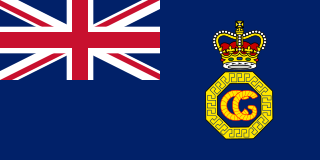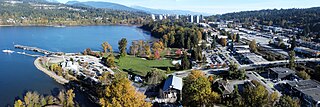
A coast guard or coastguard is a maritime security organization of a particular country. The term embraces wide range of responsibilities in different countries, from being a heavily armed military force with customs and security duties to being a volunteer organization tasked with search and rescue without law enforcement authority. In most countries, a typical coast guard's functions are distinct from those of the navy and the transit police, while in certain countries they have similarities to both.

Search and rescue (SAR) is the search for and provision of aid to people who are in distress or imminent danger. The general field of search and rescue includes many specialty sub-fields, typically determined by the type of terrain the search is conducted over. These include mountain rescue; ground search and rescue, including the use of search and rescue dogs ; urban search and rescue in cities; combat search and rescue on the battlefield and air-sea rescue over water.

Mountain rescue refers to search and rescue activities that occur in a mountainous environment, although the term is sometimes also used to apply to search and rescue in other wilderness environments. This tends to include mountains with technical rope access issues, snow, avalanches, ice, crevasses, glaciers, alpine environments and high altitudes. The difficult and remote nature of the terrain in which mountain rescue often occurs has resulted in the development of a number of specific pieces of equipment and techniques. Helicopters are often used to quickly extract casualties, and search dogs may be deployed to find a casualty.

Coquitlam is a city in the Lower Mainland of British Columbia, Canada. Mainly suburban, Coquitlam is the sixth-largest city in the province, with a population of 148,625 in 2021, and one of the 21 municipalities comprising Metro Vancouver. The mayor is Richard Stewart.

Port Coquitlam is a city in British Columbia, Canada. It is one of 21 municipalities comprising Metro Vancouver. Located 27 km (17 mi) east of Vancouver, it is on the north bank of the confluence of the Fraser River and the Pitt River. Coquitlam borders it to the north and west. Pitt Meadows lies across the Pitt River from it. Port Coquitlam is bisected by Lougheed Highway and the Canadian Pacific Kansas City railway. Port Coquitlam is often referred to as "PoCo". It is Canada's 93rd-largest municipality by population.

His Majesty's Coastguard (HMCG) is the section of the Maritime and Coastguard Agency responsible, through the Secretary of State for Transport to Parliament, for the initiation and co-ordination of all maritime search and rescue (SAR) within the UK Maritime Search and Rescue Region. This includes the mobilisation, organisation and tasking of adequate resources to respond to persons either in distress at sea, or to persons at risk of injury or death on the cliffs or shoreline of the United Kingdom. Since 2015 it has also been responsible for land-based search and rescue helicopter operations.

The Canadian Coast Guard is the coast guard of Canada. Formed in 1962, the coast guard is tasked with marine search and rescue (SAR), communication, navigation, and transportation issues in Canadian waters, such as navigation aids and icebreaking, marine pollution response, and support for other Canadian government initiatives. The Coast Guard operates 119 vessels of varying sizes and 23 helicopters, along with a variety of smaller craft. The CCG is headquartered in Ottawa, Ontario, and is a special operating agency within Fisheries and Oceans Canada.

Port Moody is a city in British Columbia, Canada, and a member municipality of the Metro Vancouver Regional District. It envelops the east end of Burrard Inlet and is the smallest of the Tri-Cities, bordered by Coquitlam on the east and south and by Burnaby on the west. The villages of Belcarra and Anmore, along with the rugged Coast Mountains, lie to the northwest and north, respectively. It is named for Richard Clement Moody, the first lieutenant governor of the Colony of British Columbia.

Belcarra is a village on the shore of Indian Arm, a side inlet of Burrard Inlet, and is part of Metro Vancouver. It lies northwest of Port Moody and immediately east of the Deep Cove area of North Vancouver, across the waters of Indian Arm. Isolated by geography on a narrow peninsula, Belcarra is accessible by a single winding paved road or by water. Before incorporation it was commonly known as Belcarra Bay.

Lions Bay is a small residential community in British Columbia, Canada, located between Vancouver and Squamish on the steep eastern shore of Howe Sound. In the 2021 census the community had a population of 1,390, BC's 36th smallest municipality by population. At 2.53 square kilometres (0.98 sq mi), it is BC's 10th smallest municipality by land area. Originally a boat-access summer camping destination for Vancouverites, Lions Bay began to be permanently settled in the 1960s. The community incorporated as a village municipality in January 1971.

The Canadian Coast Guard Auxiliary is a Canada-wide volunteer marine association dedicated to marine search and rescue (SAR) and the promotion of boating safety, through association with the Canadian Coast Guard under the auspices of Canada's National Search and Rescue Program.

The National Search and Rescue Program (NSP) is the name given by the Government of Canada to the collective search and rescue (SAR) activities in Canada. Until 2015, the NSP was administered by the National Search and Rescue Secretariat (NSS).

Mount Burke, 1,270 m (4,167 ft), is a mountain located in northeast Coquitlam, British Columbia, north of Port Coquitlam on the ridge system leading to Coquitlam Mountain. Most of the mountain is part of Pinecone Burke Provincial Park. Mount Burke is found in Coquitlam near Minnekhada Regional Park.

Westwood Plateau is a neighbourhood in the northern region of Coquitlam, British Columbia.
The Ministry of Emergency Management and Climate Readiness (EMCR), formerly Emergency Management BC (EMBC), is a provincial government department in the Canadian province of British Columbia. EMCR works with local governments and other provincial and federal agencies year round, providing coordination and support before, during and after emergencies. EMCR is administered under the Emergency Program Act.
The Joint Rescue Coordination Centre Victoria (JRCC Victoria) is a rescue coordination centre operated by the 1 Canadian Air Division (Canadian Armed Forces) and staffed by personnel of the Royal Canadian Air Force (RCAF) and the Canadian Coast Guard (CCG).

North Shore Rescue is a non-profit organization dedicated to wilderness search and rescue around Vancouver, British Columbia, Canada. It consists of a team of approximately 40 volunteers who perform an average of 79 search and rescue operations each year, mostly in the rugged, steep, and thickly forested North Shore Mountains. North Shore Rescue assists hikers, skiers, snowshoers, mountain bikers, and others who are reported to be lost or in distress. It also provides education on mountain safety, and some services in urban search and rescue.

The Helicopter Flight Rescue System (HFRS) is a helicopter insertion and extraction tool that utilizes a longline and personnel carrying device system (PCDS) to carry human loads below a helicopter in flight. These systems are often referred to as "long line", "short haul", Class D fixed line (CDFL), and other terms, and is similar to other helicopter long line systems in use throughout the world. By extending a rescuer below the aircraft and allowing the aircraft to remain clear of obstacles while a rescue is performed, a pilot can insert or extract rescuers and subjects in most types of terrain.
Royal Canadian Marine Search and Rescue (RCMSAR) is a volunteer marine rescue service that saves lives and promotes public recreational boating safety throughout the coastal and some inland waters of the province of British Columbia and is associated with the national organization of the Canadian Coast Guard Auxiliary.

Mount Seymour Provincial Park is a park in Vancouver, British Columbia's North Shore Mountains. With an area of 35 square kilometres, it is located approximately 15 kilometres north of Downtown Vancouver. The park, named after Frederick Seymour, was established in 1936. Mount Seymour Provincial Park provides visitors with a variety of recreational activities and animals with natural habitat.

















